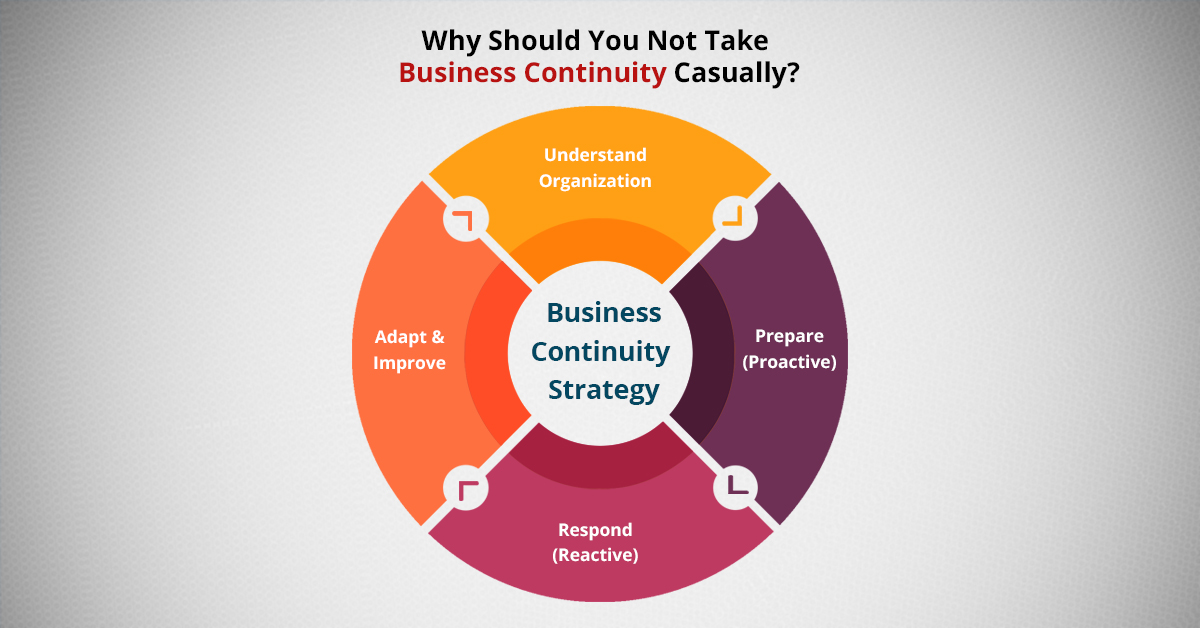Why Should You Not Take Business Continuity Casually?
Let’s Start With Basics – What is Business Continuity?
The term – ‘Business Continuity’ is quite expressive, meaning the ability to continue the business should have even after something disrupting or destroying has happened. The capability to recover and sustain vital operations during, and also after a disaster happens is the definition of business continuity in the simplest terms. The planning of business continuity involves establishing the processes of risk management and methods meant to avoid disturbances in mission-critical operations. Also, it consists of managing the re-establishment of the organisation’s services in full-fledge as soon and smooth as possible.
In general terms, the culture of the organisation also plays a vital role in business continuity. You ask how? Well, let me explain.
On a broader scale, ‘culture’ is what we call the attitude and behaviour which people reflect on a day-to-day basis habitually. So, in specific terms, this business continuity culture means the full commitment of the people to mould and enhance business procedures and strategies. This way, everyone in the organisation together strives to attain a single goal, i.e., resilience, which finally contributes to the success of the company.
So, if you have to develop a business continuity culture in your organisation and want every person to follow it, then you will have to mention it in the terms for them so they can align with those. You can build an effective business continuity method by relating it with what your company actually sells.
For Understanding this Process, Please Answer a Few Questions Below –
-
Define the characteristics of your industry. Like is it retail, manufacturing, energy, software, finance, healthcare, services, or government?
-
What do you sell? A product(s) or service(s)? What kind of monetary investment does it require, small or big? What sort of commitment the does client signify?
-
To whom are you selling? What is your TG (target group) and what are its demographic characteristics? Know their trouble points and motivational points.
-
What is your sales model? On what medium you rely – advertising or networking? Offline or online sales? Define the steps in your sales cycle.
-
What do you do to retain clients? What you do for generating a better customer experience? How will your clients come back wanting more?
So, answering these questions will make you understand the essential factors, and hence you will have all the vital information you need. By having these, you can effectively combine the culture and business continuity program together.
For example, we will see how is this going to work for an investment firm. So, practically an investment firm asks people to set aside a significant amount of money in case of a health crisis, and they make you believe that you might become severely ill one day and you are going to need this money. And, when an investor is going to put so much money, he/she has to know how trustworthy that firm is? Whether their money is going to be safe or not? What becomes if a big crisis happens? What if the investor cannot reach the firm by any means?
Wondering, What the Answers Could Be?
Well, the answers to all these questions come under the ambit of one thing – business continuity! Hence, business continuity is directly proportional to the practice of persuading clients to invest in the firm. And, of course, customer retention is the second major process after acquiring them. The customers are going to stay if they know that your organisation maintains resiliency; no matter whatever bad event may occur.
Closing Description
Understanding the above example will show you how business continuity transforms the reputation in the opinion of others. It is not just an entity which conducts the assessments of business impacts and then creates plans. Instead, business continuity aims to build a culture via following a program which can exponentially contribute to the success of the organisation.
When you think of it in this way, you will agree to act vigorously upon it. You can build a solid plan with the budget you need, and you will get the recognition for it. Eventually, the culture of your organisation would be so strong that everyone can trust you for the business continuity you provide.
To know more, visit: https://esds.co.in/disaster-recovery-hosting
- Have You Chosen the Right Cloud Service for Migration? - December 6, 2019
- IoT Touching Your Life - November 12, 2019
- Transform and Automate Your Logistics with RPA - November 5, 2019



